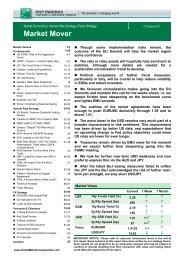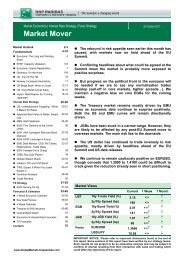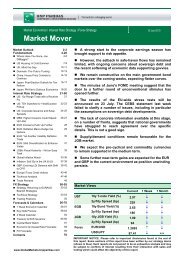Market Economics | Interest Rate Strategy - BNP PARIBAS ...
Market Economics | Interest Rate Strategy - BNP PARIBAS ...
Market Economics | Interest Rate Strategy - BNP PARIBAS ...
Create successful ePaper yourself
Turn your PDF publications into a flip-book with our unique Google optimized e-Paper software.
<strong>Market</strong> Outlook<br />
The major developments in advanced country bond markets have centred<br />
on the eurozone, where peripheral tensions remain and where Trichet has<br />
taken a more hawkish tone.<br />
Portugal’s tensions<br />
probably not over<br />
A more holistic solution<br />
will come in the eurozone,<br />
but when?<br />
The European authorities seem to have realised that the piecemeal<br />
approach to dealing with the crisis in the peripherals is not working and<br />
something more holistic is required. While Portugal‘s auctions went well this<br />
week, the underlying pressure remains. With a current account deficit of<br />
almost 10% of GDP last year, domestic savings are insufficient to meet the<br />
Portuguese government’s financing needs. Hence, there is a need for<br />
inflows from nervy foreigners. Despite the auction, market belief in Portugal’s<br />
ability to evade the EFSF remains weak. If uncertainty about Portugal<br />
increases then there will be spillovers to Spain and Belgium. If Portugal does<br />
go into the EFSF, the “who’s next?” mentality will affect them also.<br />
Hence the talk of increasing the EFSF’s resources (which it would only need<br />
if the strains went beyond Portugal) and remit, perhaps to buy existing bonds<br />
also. We welcome this. The European crisis could in theory result in<br />
integration or disintegration. We have always been in the former camp and it<br />
seems that we are edging towards that. However, the path will not be<br />
smooth. More funds for support means more conditionality and, for<br />
borrowers, less national fiscal (and therefore political) sovereignty. What are<br />
the modalities of that and how is the national political will for that to be<br />
mobilised? Maybe only through repeated crises. Thus, while this week’s<br />
news has been more positive, we are far from out of the woods.<br />
When we do see a more comprehensive and coherent framework, it will not<br />
be good news for core bonds: a) the flight-to-quality bid will be reduced; b)<br />
Germany’s prospective fiscal burdens will rise; and c) there will be one less<br />
restraint on the ECB as regards unconventional measures and rates.<br />
Trichet’s inflation concerns<br />
increase<br />
Trichet’s stance in the press conference was surprisingly hawkish given the<br />
context of stress in the periphery. The emphasis was on inflation and shows<br />
clearly that the ECB’s risk assessment on inflation is shifting, reflecting<br />
higher global prices and upward surprises to activity (see Brazil focus for an<br />
illustration of why EM inflation is becoming troublesome). His comment that<br />
the ECB is never pre-committed not to raise rates when inflation looks set to<br />
rise in the immediate months ahead can only be seen as hawkish. Further, it<br />
stands in contrast to the Fed’s undertaking to keep rates exceptionally low<br />
for an “extended period”. This suggests quite clearly that the ECB will move<br />
rates higher sooner than the Fed, as EUR/USD was not slow to price, the<br />
reason for that being very different inflation assessments. It is likely in the<br />
period ahead that the market will price in more and earlier ECB tightening.<br />
While we see an important obstacle to that being likely peripheral tensions, it<br />
is clear which way the market wind is blowing.<br />
In the bond markets, the negative tone could lose momentum, especially in<br />
the US, after this week's auctions. Statistically, there is a decent bias for<br />
Treasuries to richen in the days following the 30y auction, perhaps because<br />
the auction set-up process is over. However, near-term momentum could<br />
still be driven by events in Europe.<br />
Fed to buy more than<br />
expected this month<br />
The Fed announced the QE2 buyback schedule for the coming month, and<br />
the size of USD 112bn was higher than most street estimates of around<br />
Paul Mortimer-Lee 13 January 2011<br />
<strong>Market</strong> Mover 2 www.Global<strong>Market</strong>s.bnpparibas.com

















